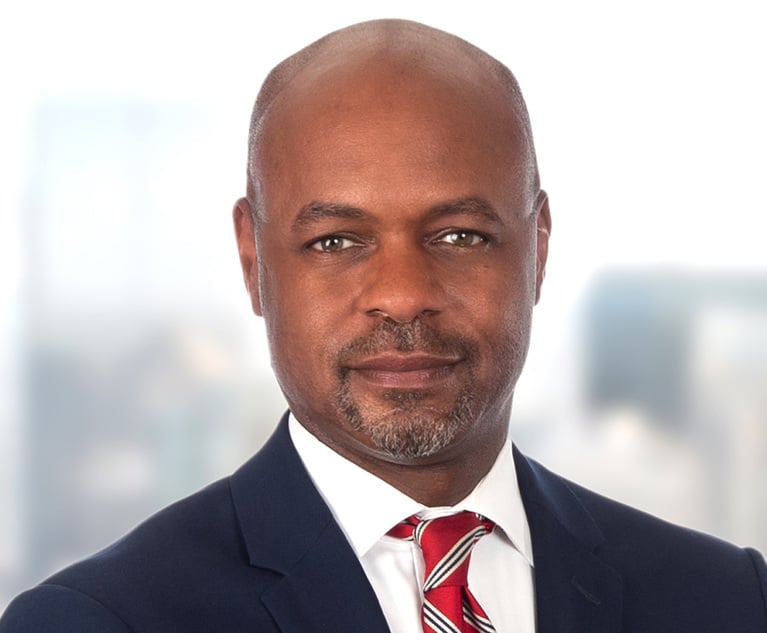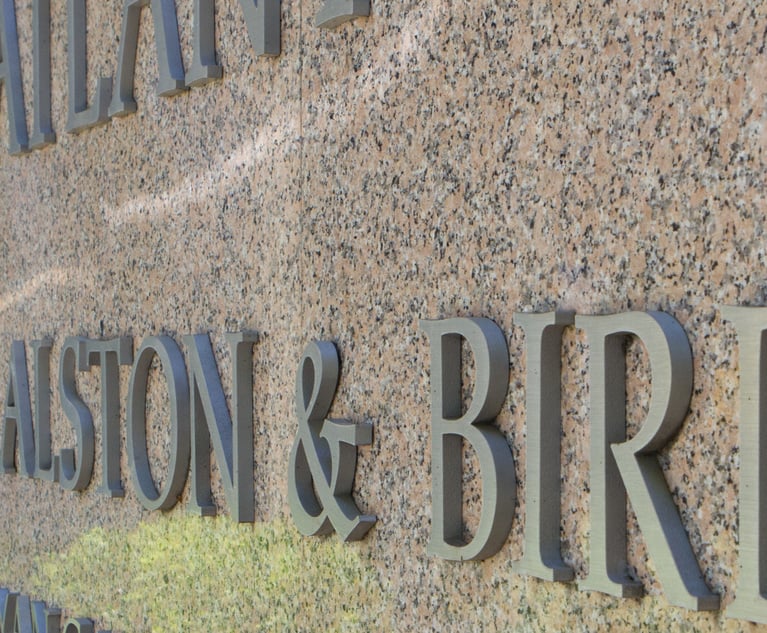 Judge Anne Elizabeth Barnes, Georgia Court of Appeals (Photo: John Disney/ALM)
Judge Anne Elizabeth Barnes, Georgia Court of Appeals (Photo: John Disney/ALM)Appeals Court Says Binding Arbitration Clauses Apply to Legal Malpractice Claims
The Court of Appeals reversed a trial judge who refused to enforce a binding arbitration clause he found to be an unconscionable violation of public policy.
March 19, 2019 at 03:43 PM
6 minute read
In what is likely destined to be a high court showdown, the Georgia Court of Appeals ruled that nothing in state law bars lawyers from including binding arbitration clauses in representation contracts and that such clauses are enforceable even in disputes involving allegations of legal malpractice.
The opinion overturns a trial judge's ruling that such clauses are “unconscionable” and unenforceable unless there is evidence that the ramifications of signing have been explained to prospective clients. The ruling is a victory for attorney Darren Summerville and his firm, which sought to compel arbitration under their contract provisions after a former client sued them for legal malpractice.
The opinion, authored by Presiding Judge Anne Elizabeth Barnes with the concurrence of Judges Amanda Mercier and E. Trenton Brown III, acknowledged that a state bar rule and American Bar Association model rule could be read to support such a position.
While representation agreement contracts that violate the public interest may be deemed unenforceable, “we decline to adopt a blanket rule that an arbitration clause in an attorney-client contract is unconscionable and against public policy if the attorney did not explain the potential disadvantages of the clause to his prospective client,” Barnes wrote.
In adopting the Georgia Arbitration Code, the Legislature made it clear that it favors the enforcement of arbitration clauses, the opinion said. The use of judicial authority to declare such a provision a violation of public policy “should be exercised cautiously.”
Furthermore, Barnes wrote, only the Supreme Court of Georgia has the “inherent and exclusive authority” to govern the practice of law in this state, and the Supreme Court has not addressed” whether the ABA model and interpretation of its rule applies to the Georgia bar.
Therefore, “we conclude that the trial court erred in finding the Arbitration Clause unconscionable and in denying the Summerville defendants' motion to compel arbitration.”
Summerville's lawyer, Hawkins Parnell & Young partner Kathryn Whitlock, said via email that she could not comment on the pending litigation, “but I can say we are pleased with the Court of Appeals' decision and think that the court got it right.”
The plaintiff, vein clinic Innovative Images and its owner, are represented by Roswell legal malpractice specialist Warren Hinds, who said the matter should be resolved by the Supreme Court.
“At oral argument and in its opinion, the Court of Appeals struggled with the conflict between the Supreme Court of Georgia's inherent and exclusive authority to govern the practice of law and the omitted reference to attorney-client relationships in the Georgia Arbitration Code,” said Hinds in an email.
“This issue is one of important public policy coupled with attorney regulation,” he said. “I believe the grant of certiorari would certainly be appropriate in this case.”
The underlying case began with unrelated litigation between Innovative Images and a former doctor there, Louis Prevosti, that ended with the clinic on the losing end of a $545,000 judgment in 2013.
The clinic retained Summerville to represent it in posttrial proceedings, and he filed a notice of appeal but failed to request a transcript of a particular hearing until several months later.
Prevosti asked the trial court to dismiss the appeal because the transcript had not been timely filed, which it did. The Court of Appeals declined to hear an appeal of that order.
Prevosti again sued Innovative seeking payment of the judgment in 2016, according to its filings. Innovative spent more than $350,000 defending that suit, which was dismissed without prejudice in 2017. Summerville's firm was not involved in that litigation.
Innovative sued Summerville in Fulton County State Court later that year for legal malpractice, breach of contract and breach of fiduciary duties, seeking unspecified economic and punitive damages.
Summerville asked the court to dismiss the case and compel arbitration arguing, among other things, that the arbitration clause barred it.
Judge John Mather declined to dismiss the case, writing that validity of an arbitration clause in an attorney-client agreement appeared to be an issue of first impression in Georgia.
Mather's order noted that State Bar Rule 1.4 requires a lawyer to “explain a matter to the extent reasonably necessary to make informed decisions” and that the American Bar Association has said that, in cases involving fee disputes and legal malpractice claims, “depending on the sophistication of the client,” lawyers should “explain the possible adverse consequences as well as the benefits arising from execution of the agreement.”
“Here, the record contains no indication that any aspect of binding arbitration was discussed” with Innovative, Mather wrote, declining to enforce the provision.
In reversing Mather's order, Barnes said that there was nothing in Georgia case law supporting the conclusion that an arbitration clause is per se unconscionable.
“Furthermore,” she wrote, “an arbitration clause is not unconscionable because the contracting parties have differing levels of sophistication or different understandings of how arbitration is conducted. … [W]hen a party signs a contract containing an arbitration clause, the party is presumed to have read and understood the clause.”
“In the present case, in addition to the foregoing well-settled principles counseling against a finding of unconscionability, there was no evidence that the Summerville defendants took advantage of Innovative, fraudulently or otherwise,” the opinion said.
Innovative had also argued that, in the alternative, Mather's ruling should be upheld because the arbitration clause “was discretionary rather than mandatory with respect to any dispute other than over attorney fees.”
Barnes' opinion said such an interpretation flew in the face of the clause's plain language, which said that, if a dispute cannot be arbitrated, “the parties consent to the jurisdiction of and venue in the courts of Fulton County, Georgia.”
“But that venue provision, when read in pari materia with the other language of the Arbitration Clause, would apply only in the limited circumstances where both contracting parties chose to waive arbitration or the arbitration clause was deemed unenforceable by a court,” Barnes said.
“Contrary to Innovative's argument, the Arbitration Clause was mandatory based on its clear and unambiguous language. Consequently, the trial court's denial of the Summerville defendants' Motion to Compel Arbitration cannot be affirmed on the alternative ground that the Arbitration Clause was optional,” she wrote.
This content has been archived. It is available through our partners, LexisNexis® and Bloomberg Law.
To view this content, please continue to their sites.
Not a Lexis Subscriber?
Subscribe Now
Not a Bloomberg Law Subscriber?
Subscribe Now
NOT FOR REPRINT
© 2024 ALM Global, LLC, All Rights Reserved. Request academic re-use from www.copyright.com. All other uses, submit a request to [email protected]. For more information visit Asset & Logo Licensing.
You Might Like
View All

Georgia Supreme Court Honoring Troutman Pepper Partner, Former Chief Justice
2 minute read

After 2024's Regulatory Tsunami, Financial Services Firms Hope Storm Clouds Break
Trending Stories
- 1'Largest Retail Data Breach in History'? Hot Topic and Affiliated Brands Sued for Alleged Failure to Prevent Data Breach Linked to Snowflake Software
- 2Former President of New York State Bar, and the New York Bar Foundation, Dies As He Entered 70th Year as Attorney
- 3Legal Advocates in Uproar Upon Release of Footage Showing CO's Beat Black Inmate Before His Death
- 4Longtime Baker & Hostetler Partner, Former White House Counsel David Rivkin Dies at 68
- 5Court System Seeks Public Comment on E-Filing for Annual Report
Who Got The Work
Michael G. Bongiorno, Andrew Scott Dulberg and Elizabeth E. Driscoll from Wilmer Cutler Pickering Hale and Dorr have stepped in to represent Symbotic Inc., an A.I.-enabled technology platform that focuses on increasing supply chain efficiency, and other defendants in a pending shareholder derivative lawsuit. The case, filed Oct. 2 in Massachusetts District Court by the Brown Law Firm on behalf of Stephen Austen, accuses certain officers and directors of misleading investors in regard to Symbotic's potential for margin growth by failing to disclose that the company was not equipped to timely deploy its systems or manage expenses through project delays. The case, assigned to U.S. District Judge Nathaniel M. Gorton, is 1:24-cv-12522, Austen v. Cohen et al.
Who Got The Work
Edmund Polubinski and Marie Killmond of Davis Polk & Wardwell have entered appearances for data platform software development company MongoDB and other defendants in a pending shareholder derivative lawsuit. The action, filed Oct. 7 in New York Southern District Court by the Brown Law Firm, accuses the company's directors and/or officers of falsely expressing confidence in the company’s restructuring of its sales incentive plan and downplaying the severity of decreases in its upfront commitments. The case is 1:24-cv-07594, Roy v. Ittycheria et al.
Who Got The Work
Amy O. Bruchs and Kurt F. Ellison of Michael Best & Friedrich have entered appearances for Epic Systems Corp. in a pending employment discrimination lawsuit. The suit was filed Sept. 7 in Wisconsin Western District Court by Levine Eisberner LLC and Siri & Glimstad on behalf of a project manager who claims that he was wrongfully terminated after applying for a religious exemption to the defendant's COVID-19 vaccine mandate. The case, assigned to U.S. Magistrate Judge Anita Marie Boor, is 3:24-cv-00630, Secker, Nathan v. Epic Systems Corporation.
Who Got The Work
David X. Sullivan, Thomas J. Finn and Gregory A. Hall from McCarter & English have entered appearances for Sunrun Installation Services in a pending civil rights lawsuit. The complaint was filed Sept. 4 in Connecticut District Court by attorney Robert M. Berke on behalf of former employee George Edward Steins, who was arrested and charged with employing an unregistered home improvement salesperson. The complaint alleges that had Sunrun informed the Connecticut Department of Consumer Protection that the plaintiff's employment had ended in 2017 and that he no longer held Sunrun's home improvement contractor license, he would not have been hit with charges, which were dismissed in May 2024. The case, assigned to U.S. District Judge Jeffrey A. Meyer, is 3:24-cv-01423, Steins v. Sunrun, Inc. et al.
Who Got The Work
Greenberg Traurig shareholder Joshua L. Raskin has entered an appearance for boohoo.com UK Ltd. in a pending patent infringement lawsuit. The suit, filed Sept. 3 in Texas Eastern District Court by Rozier Hardt McDonough on behalf of Alto Dynamics, asserts five patents related to an online shopping platform. The case, assigned to U.S. District Judge Rodney Gilstrap, is 2:24-cv-00719, Alto Dynamics, LLC v. boohoo.com UK Limited.
Featured Firms
Law Offices of Gary Martin Hays & Associates, P.C.
(470) 294-1674
Law Offices of Mark E. Salomone
(857) 444-6468
Smith & Hassler
(713) 739-1250






